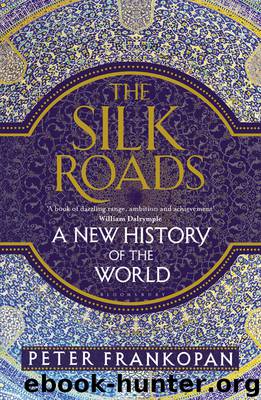The Silk Roads by Peter Frankopan

Author:Peter Frankopan [Frankopan, Peter]
Language: eng
Format: epub
ISBN: 9781408839966
Publisher: Bloomsbury Publishing
Published: 0101-01-01T00:00:00+00:00
19
The Wheat Road
The British magazine Homes & Gardens has long prided itself on being at the cutting edge of interior design. ‘Mixing beautiful features with gorgeous real-life homes and gardens, expert advice and practical information’, the magazine declares in its recent marketing strapline, is ‘the ultimate source of decorating inspiration’. Its November 1938 issue gushed with praise about a mountain bolt-hole rich in Alpine chic. ‘The colour scheme throughout this bright, airy chalet is light jade green,’ wrote the correspondent, enlivened by the passion for cut flowers displayed by the owner – who as it happened was also the property’s ‘decorator, designer and furnisher, as well as architect’. His watercolour sketches hung in the guest bedrooms, alongside old engravings. A ‘droll raconteur’, the owner loved being surrounded by a range of ‘brilliant foreigners, especially painters, musicians and singers’, and would often bring in ‘local talent’ to play pieces by Mozart or Brahms for after-dinner entertainment. The article’s author was very impressed by Adolf Hitler.1
Nine months later, on 21 August 1939, an eagerly awaited call came through to the telephone exchange which Homes & Gardens reported was next to his modern office and which allowed ‘the Führer’ to be in contact with ‘his friends or Ministers’. During supper, a message was passed to Hitler. According to one who was present, ‘he scanned it, stared into space for a moment, flushed deeply, then banged on the table so hard that the glasses rattled’. He turned to his guests and said excitedly, ‘I have them! I have them!’2 He sat down to eat, no doubt faced with the usual ‘imposing array of vegetarian dishes, savoury and rich, pleasing to the eye as well as to the palate’, admired by the Homes & Garden journalist a year earlier, and prepared by Hitler’s personal chef, Arthur Kannenberg – who often came out of the kitchen in the evenings to play his accordion.3
After the meal, Hitler called his dinner guests together, and told them that the paper he was holding contained the text of a reply that he had been waiting for from Moscow. Stalin, the undisputed master of the Soviet Union, had agreed to sign a treaty of non-aggression with Germany. ‘I hope’, the teletype read, ‘that [this] will bring about a decided turn for the better in relations between our two countries.’4 Two nights later, after the news had been announced, Hitler and his entourage stood on the terrace, looking into the valley below. ‘The final act of Götterdämmerung could not have been more effectively staged,’ noted the leading Nazi, Albert Speer.5
Ironically, the extraordinary agreement was prompted by British and French foreign policy. Both countries had been trying desperately to find ways to contain the German Chancellor after becoming alarmed by his high-stakes political poker in the 1930s – with little success. So little, in fact, that Mussolini confided in his Foreign Minister Count Ciano that Britain’s politicians and diplomats were not made of the same stuff as ‘the Francis Drakes’ and the other
Download
This site does not store any files on its server. We only index and link to content provided by other sites. Please contact the content providers to delete copyright contents if any and email us, we'll remove relevant links or contents immediately.
China Rich Girlfriend by Kwan Kevin(3896)
The Silk Roads by Peter Frankopan(3760)
Annapurna by Maurice Herzog(2839)
Hot Thai Kitchen by Pailin Chongchitnant(2812)
Full Circle by Michael Palin(2772)
Okonomiyaki: Japanese Comfort Food by Saito Yoshio(2391)
City of Djinns: a year in Delhi by William Dalrymple(2136)
The Ogre by Doug Scott(2114)
Photographic Guide to the Birds of Indonesia by Strange Morten;(2088)
Tokyo by Rob Goss(2018)
Vietnam, Cambodia, Laos & Northern Thailand by Lonely Planet(2014)
Tokyo Geek's Guide: Manga, Anime, Gaming, Cosplay, Toys, Idols & More - The Ultimate Guide to Japan's Otaku Culture by Simone Gianni(1946)
Discover China Travel Guide by Lonely Planet(1866)
Everest the Cruel Way by Joe Tasker(1827)
China (Lonely Planet, 11th Edition)(1798)
Lonely Planet China(1753)
China Travel Guide by Lonely Planet(1740)
Top 10 Dubai and Abu Dhabi by DK Travel(1717)
Iranian Rappers And Persian Porn by Maslin Jamie(1710)
